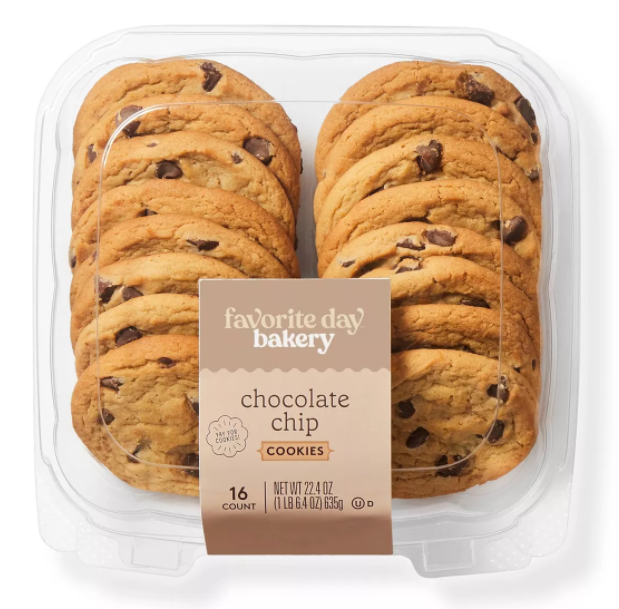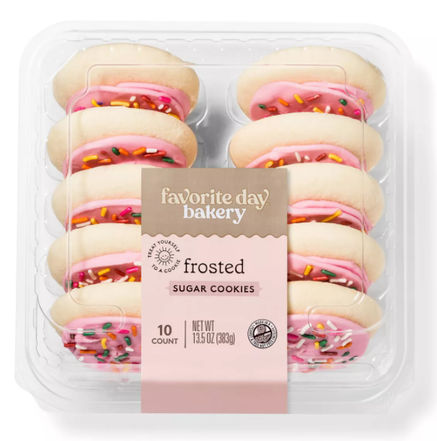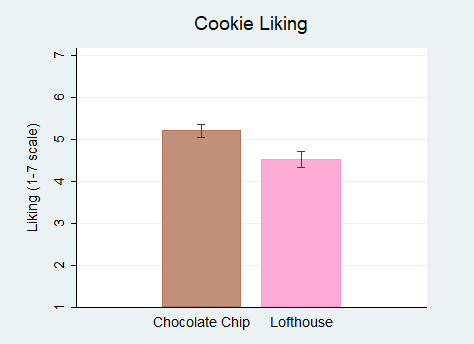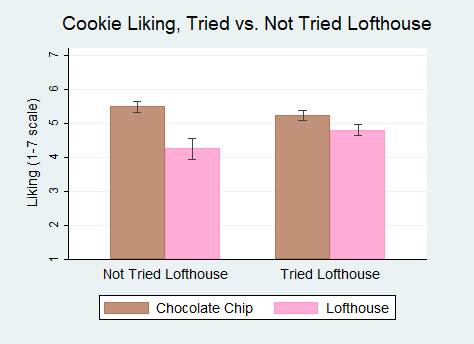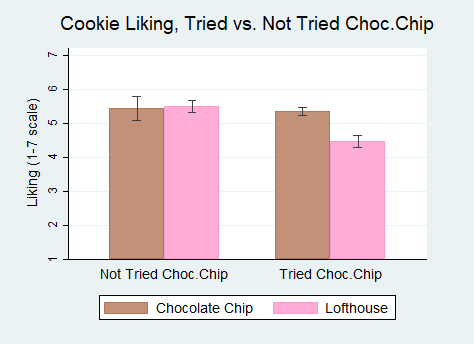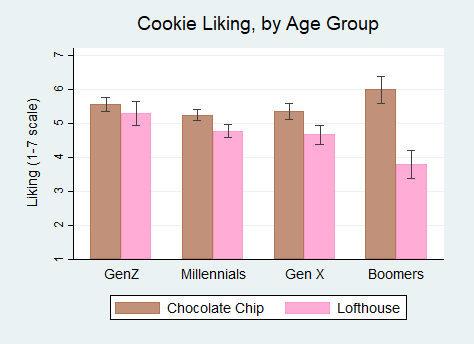Overview
Cookies are one of the most popular desserts in the U.S. But there’s an endless array of types. Sugar cookies, M&M, peanut butter, oatmeal raisin, macadamia nut, and of course, the traditional chocolate chip cookie.
A more recent type of cookie that has become loved by some and loathed by others is the Lofthouse cookie. Lofthouses, more commonly known as frosted sugar cookies, are in fact a softer, thicker form of the traditional frosted sugar cookie. They’ve become a part of cookie pop culture due to strong reactions from fans and haters.
We wondered how much people, on average, like Lofthouse cookies relative to standard chocolate chip cookies. So we tested it using a simple randomized survey.
The Experiment
We recruited 400 people on Amazon Mechanical Turk to view one of two photos, of either Lofthouse cookies or chocolate chip cookies (randomly assigned), then asked them how much they liked those cookies.
Participants were told to “Look at the cookies below…” then shown one of the following photos. We selected both photos due to their similar nature, which holds constant other factors that might influence participants’ ratings, like packaging, labelling, brand, etc.
Cookies are one of the most popular desserts in the U.S. But there’s an endless array of types. Sugar cookies, M&M, peanut butter, oatmeal raisin, macadamia nut, and of course, the traditional chocolate chip cookie.
A more recent type of cookie that has become loved by some and loathed by others is the Lofthouse cookie. Lofthouses, more commonly known as frosted sugar cookies, are in fact a softer, thicker form of the traditional frosted sugar cookie. They’ve become a part of cookie pop culture due to strong reactions from fans and haters.
We wondered how much people, on average, like Lofthouse cookies relative to standard chocolate chip cookies. So we tested it using a simple randomized survey.
The Experiment
We recruited 400 people on Amazon Mechanical Turk to view one of two photos, of either Lofthouse cookies or chocolate chip cookies (randomly assigned), then asked them how much they liked those cookies.
Participants were told to “Look at the cookies below…” then shown one of the following photos. We selected both photos due to their similar nature, which holds constant other factors that might influence participants’ ratings, like packaging, labelling, brand, etc.
Participants were then asked, "To what extent do you like these cookies?" and responded by answering on a 1-7 scale (1 = Not at all, 7 = Extremely). At the end of the survey, we included a question asking “Which of the following types of cookies have you eaten before? (select all that apply)” with both pictures of the cookies again shown; this question served to limit our analysis to just those who’d tried both types of cookies.
Results
Overall, 85% of participants had eaten chocolate chip cookies before, and 67% had eaten Lofthouse cookies. We had 219 participants, or 54% of our sample, who’d eaten both types of cookies before.
Using an independent samples t-test, we found that people liked chocolate chip cookies (avg. = 5.21) significantly more than Lofthouse frosted sugar cookies (avg. = 4.53), (p = 0.010). This difference of 0.68 for our tried-both-cookies participants was about the same as the difference for our full sample of participants (0.67). Gender did not influence the results (p = 0.388).
Overall, 85% of participants had eaten chocolate chip cookies before, and 67% had eaten Lofthouse cookies. We had 219 participants, or 54% of our sample, who’d eaten both types of cookies before.
Using an independent samples t-test, we found that people liked chocolate chip cookies (avg. = 5.21) significantly more than Lofthouse frosted sugar cookies (avg. = 4.53), (p = 0.010). This difference of 0.68 for our tried-both-cookies participants was about the same as the difference for our full sample of participants (0.67). Gender did not influence the results (p = 0.388).
We did note an interesting observation. For some people, Lofthouse cookies may be in poor taste, despite having never tasted them at all. We found a significant interaction between the main results and whether participants had ever tried Lofthouse cookies before. For “triers,” cookie liking was still higher for chocolate chip than Lofthouse (difference = -0.44), but for “non-triers,” this difference was much larger (difference = -1.25), (p = 0.042).
It could just be that those who had never tried Lofthouse cookies simply rated them lower, perhaps the mid-point of 4 out of 7, since they had no basis for liking or disliking them. But we’d expect the same to be true for those who’ve never tried chocolate chip cookies—and it’s not. Participants rated chocolate chip cookies highly whether or not they had ever tried them before. And the number of “4” ratings did not significantly differ between cookies or between triers vs not-triers. In fact, the percentage of Lofthouse “dislike” ratings (below a 4 out of 7) were actually higher for participants who’d never tried them before (30.2%) versus those who had (26.4%), though not statistically significant (p = 0.620).
A more plausible explanation is that chocolate chip cookies are liked more regardless of whether or not someone has tried them. The social norms around chocolate chip cookies are quite strong given their longer history than most modern cookies like Lofthouses. Indeed, we found a significant interaction term between our main difference and age (interaction term = -0.04, p = 0.010), such that baby boomers liked chocolate chip cookies even more, and Lofthouse cookies even less.
A cautionary note regarding these results. The interaction analyses are exploratory, and thus we’d put less faith in them replicating than the main results. The main results, while more likely to replicate if we ran this study again on MTurk, are beholden to our limited sample. It’s impossible to say how the results may change in a different sample, or a truly representative sample of the U.S. population. Nevertheless, for a cookie study the results are certainly interesting.
Conclusion
It looks like the more modern Lofthouse cookie is still inferior to good ol’ chocolate chip. At least according to our MTurk sample. But some of the disdain toward Lofthouses might be psychological, or the product of social norms that favor more traditional cookies like chocolate chip. So, if you’re trying to decide what cookies to bring to a party, chocolate chip might be your safest bet. But if you like Lofthouses, feel free to get some for yourself.
Methods Note:
We used an independent samples t-test to test for significant differences in liking between chocolate chip and Lofthouse cookies, For significant differences, the coefficient would be large and its corresponding “p-value” would be small. If the p-value is less than 0.05, we consider the difference statistically significant. To test for interactions (a difference in the differences) between the main results and participants' age or whether or not they've tried a specific type of cookie, we used Ordinary Least Squares (OLS) regression analyses with interaction terms.
Popular Experiments
COVID MasksDoes wearing a COVID mask affect how others think of you?
|
Video GamesAre video games more enjoyable than board games?
Does age or gender matter? |
Zero-Sum PoliticsDo Democrats or Republicans view society as win-lose?
|

